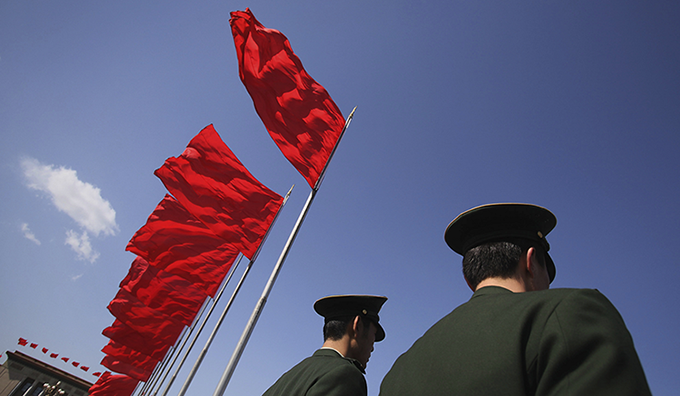Finsbury 02 May 2016 // 12:55PM GMT

The Fourth Session of the 12th National People’s Congress (“NPC”) and the Fourth Session of the 12th Chinese People’s Political Consultative Conference (“CPPCC”) took place in March. Commonly known as the “two sessions”, the annual two-week-long political meetings provide an important public glimpse into the thinking and priorities of China’s government.
China is the world’s second-largest economy. The recent volatility in global stock and the currency markets has exerted great pressure on the world economy and there is an expectation of a further slowdown in economic activity, not least within China. Many experts are claiming that slow growth will be the “New Normal” for China and, as a result, the foreign investment community has called for more adaptive and accommodative macro-measures and more transparency in terms of communication with the capital markets. Consequently, the meetings held during the two sessions were particularly closely watched, with observers scouring all comments and announcements in order to clearly understand policy priorities and reform agendas. At the same time, they were looking for signs that China was contemplating changes to its social structure and economic model.
Despite the economic slowdown, legislators put on a brave face and a confident tone. Their main message was that China will not face a hard landing, and there is more optimism than problems. Premier Li Keqiang stated that China still has many policy options it can pursue if the situation gets worse – and these don’t include massive stimulus measures and mass layoffs.
Economic restructuring is needed and will continue. The GDP growth rate was set at between 6.5% and 7%. As Premier Li remarked, the larger the total national economic volume, the more difficult it is to drive meaningful growth. Every 1% increase nowadays is the equivalent of a 1.5% increase five years ago and a 2% increase 10 years ago. As noted by some domestic media, this also marked the first time in two decades that China adopted a range for its growth target rather than a specific number.
The top legislators admitted the need to replace traditional economic growth drivers with new ones. The view by many experts is that if the economic growth forecast is lowered to 6.5%, it might show that the government is willing to leave more room for structural rebalancing, and may be more willing to endure a longer period of slower growth in order to exact changes.
Key plans/measures outlined include:
- Supply Side Reform – Increase efficiency/competitiveness of major sectors via innovation with a view to adjusting overcapacity in the manufacturing sectors
- Financial Reforms and Further Opening-up – Free trade zone model and pilot schemes already in place will continue to play a vital role in liberalizing China’s capital market and attracting more quality foreign investment
- State-owned-Enterprise Reform and the Role of the Private Sector – Collaboration aimed at promoting the growth of state-owned enterprises (SOEs) and privately-owned enterprises (POEs) by playing to each side’s core strength and looking to make it easier for money to come in
- Government Governance and Anti-Corruption – Enhance government service standards and call to create foreign investment friendly environment at all levels of government. Anti-corruption push to continue
- Industry Investment – Heavy focus on industries and areas that are of concern to the population, including healthcare and education
The international media has written about the capital outflow from China and the increasingly stringent scrutiny faced by foreign enterprises in China. But within China, we hear different voices: foreign capital is a welcome and important driver of development for the central and western regions, as the China government needs to promote the development of different regions in a coordinated way.
China attracted a total of US $126 billion foreign capital in 2015, up 5.6% over the previous year. President Xi Jinping has reiterated in several international speeches that China’s stance on utilizing foreign capital will not change. According to the Government Work Report delivered by Premier Li, China will try to create a more transparent and stable environment and a level playing field for foreign investment. To achieve this, China also vows to improve governance in all levels of administration to facilitate investment, rather than setting hurdles, as has been the case in the past.
Experts remain cautiously optimistic about the priorities and initiatives mapped out during the two sessions, and we concur. This is, after all, the blueprint guiding policy directions, and foreign businesses need to bear these government views in mind and be prepared for more sharing of technology and best practices. It is also important to understand that, for China, the purpose of encouraging foreign investment is to learn from foreign peers and get access to advanced technology and management expertise in order to boost the development of local industries. Therefore, quality instead of quantity is emphasized. Foreign businesses need to have a clear vision about their China strategy and value proposition, and these should echo the priorities set by the government. Foreign businesses should also be part of the driving force for the “structural improvement” of China’s economy.
Ideological battle still needs to be fought and Party will ensure that it wins
Media are warned to support the government and the Party, and use power wisely and for the good of China and the Communist Party. While acknowledging the role of the media to monitor and expose negative issues facing society, President Xi said the media should guide the public in a positive way and tone and serve the overall interests of the whole nation. He also called for the media to amplify the Communist Party’s voice internationally and tell the China story in an effective way.
As a result, it is likely that the Party will put more investment into the primary Party-controlled media outlets, including CCTV, Xinhua News Agency, People’s Daily and China Daily, to help them take a leading position in guiding the media’s tone and championing the core values of socialism. Digital expansion is a risk and the one area where there needs to be censorship.
Economic restructuring and a tightening of ideology are some of the ways the government will tackle the slowing economy. President Xi’s administration is still very much committed to the reform goals set out in previous policy papers, although the goals and the deliverables have been carefully adjusted to take into consideration the geopolitical environment and the economic climate China is now facing.
By Agnes Zhao, a Partner in Finsbury’s Beijing office


































.jpg)





---copy.jpg)









